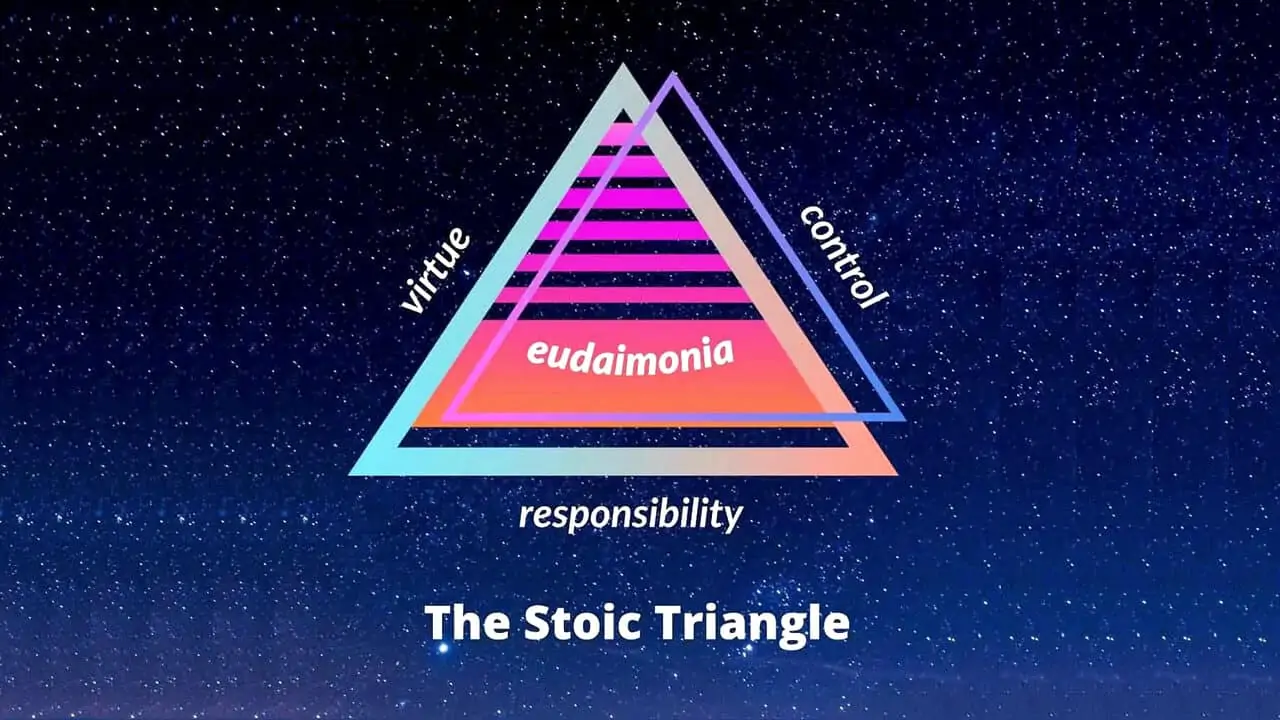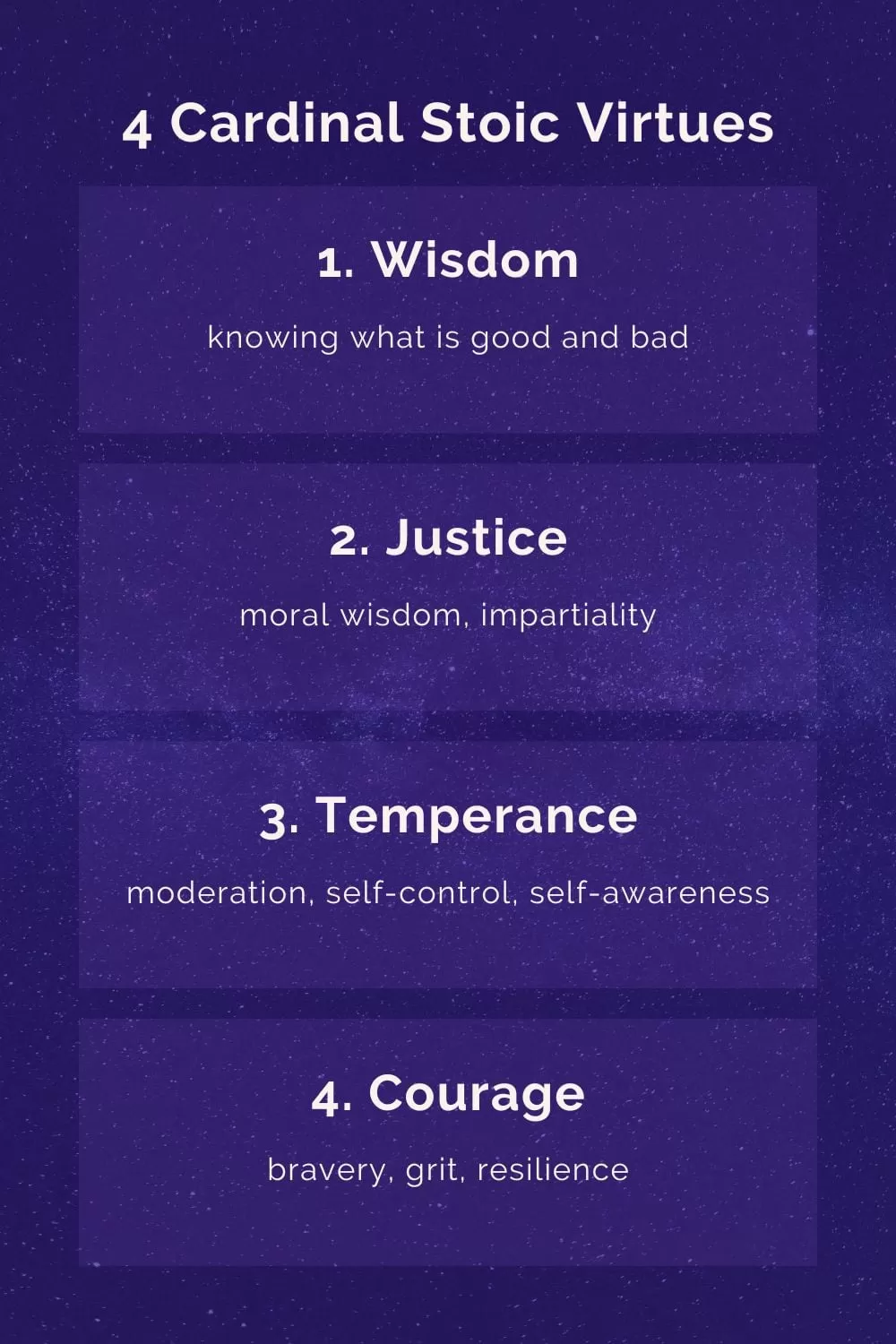Today's Saturday • 5 mins read
The Stoics held that virtue was both essential and enough for happiness. If you have virtue and nothing else, you will be happy. But you cannot be happy if you don’t have virtue.
Stoicism started in the Hellenistic period, around 300 BCE, founded by Zeno of Citium. The terms Stoic and Stoicism originate from stoa poikilê, the porch in the Athenian Agora, where Zeno gave lectures.
Stoicism began as practical advice for living life, rather than a body of philosophy to be studied in classrooms. And that is one reason why Stoicism is still relevant today.
Stoic Triangle of Happiness: Eudaimonia Triangle
The Stoic Triangle of Happiness is a visual template outlining the criteria for Stoic happiness or eudaimonia.
- The Stoic triangle of happiness has three sides as three principles (virtue, control, and responsibility) that work in harmony to make us happy.
- Stoics hold that true happiness is about living a life of virtue. It starts with focusing on what we can control, which enables us to make decisions and take responsibility, which in turn allows us to live virtuously.
- The Stoic eudaimonia triangle provides a simple and practical path to the ideal human state. It allows them to grow and become a better version of themselves, one virtuous day at a time.

3 Parts of The Stoic Happiness Triangle
The Stoic Happiness Triangle consists of three essential components:
1. Live with Virtue or Excellence (Arete)
- Definition: Arete means striving to be your best self in every moment. Stoics practice the four cardinal virtues to achieve arete or excellence.
- Mindfulness: Cultivating mindfulness and self-awareness is crucial.
- Self-Reflection: Regularly ask yourself if your actions align with the person you aspire to be.
- Marcus Aurelius’ Advice: He emphasized performing every task with care, dignity, and fairness.
- Character Development: Stoics say that small decisions accumulate over time and shape one’s character.
2. Focus on What You Can Control
- Dichotomy of Control: Stoicism teaches that while you can’t control everything, you can control your actions and judgments.
- Reframing Challenges: Instead of reacting emotionally to negative events, view them as opportunities for growth.
- Health Choices: While you can’t change your genetics, you can make informed health choices.
- Building Resilience: Adopting this mindset fosters calmness and resilience.
3. Take Responsibility
- Response to Life’s Challenges: Life may present unexpected challenges, but you still have the power to choose your response.
- Interpretation Matters: Your happiness is shaped more by your interpretation of events than by the events themselves.
- Mindful Choice: There is a space between what happens and how you respond, and choosing your response mindfully is key to taking responsibility.
Stoic Happiness or “Eudaimonia”
Eudaimonia is a Greek word for flourishing or life satisfaction. It means having a good relationship with our daemon, our divine inner nature.
- Stoic eudaimonia is the ultimate form of happiness that any human may achieve.
- Stoic eudaimonia is also the feeling one may have at the end of their active life, perhaps on their deathbed, when they look back and declare, “I have had a good life.”
Eudaimonia, sometimes spelled eudemonia, does not mean “happiness” in the modern sense of “feeling good or being cheerful,” but rather as being blessed or fortunate. In positive psychology, eudaimonia means “flourishing.”
To the Greeks, most of all Aristotle, it epitomizes the best kind of happiness. In ancient Greek philosophy, eudaimonia typifies the condition of someone living “the good life.”
An eudaimonic person has everything that is intrinsically good and is living their best possible life.
- For the Epicureans, eudaimonia was having positive feelings like pleasure (hedonia) and tranquility (ataraxia).
- For the Stoics, however, the requisite and the singular constituent of eudaimonia is “virtue” (arete).
What do the Stoics say about happiness?
They say the ideal life is lived in harmony with Nature and other people, and with a mind that is calmly indifferent to external events.
A real man doesn’t give way to anger and discontent, and such a person has strength, courage, and endurance — unlike the angry and complaining. The nearer a man comes to a calm mind, the closer he is to strength.
— Marcus Aurelius, The Philosopher King
The Stoics believe that whatever is genuinely good would ultimately benefit its owner in all circumstances and ensure their happiness.
Contrary to popular view, the Stoics regard money and property as neither good nor bad, but rather as “indifferents.” So, a Stoic’s attitude is unaffected by a lack or surplus of money.
The Roman Stoics further emphasized that the sage, a person who had reached moral and intellectual perfection, was impervious to misfortunes.
The Stoic sage never finds themselves in a position where they must go against their natural desire. The only instance they accept that something is bad is when it threatens their virtue.
The Stoics were clear that living a happy life required possessing and practicing the four cardinal virtues of wisdom, temperance, justice, and courage.
The only things that are good are the virtues of the human mind.
Final Words
Stoicism takes a timeless approach to be the philosophy of everyday life. It has survived for over 2000 years.
You can be a practicing modern Stoic today, despite your busy life, without abandoning your worldly duties. And find the Stoic triangle of happiness in your life.
√ Also Read: 7 Secrets Why Stoics Are Happier Than You Think
√ Please share this if you found it helpful.
